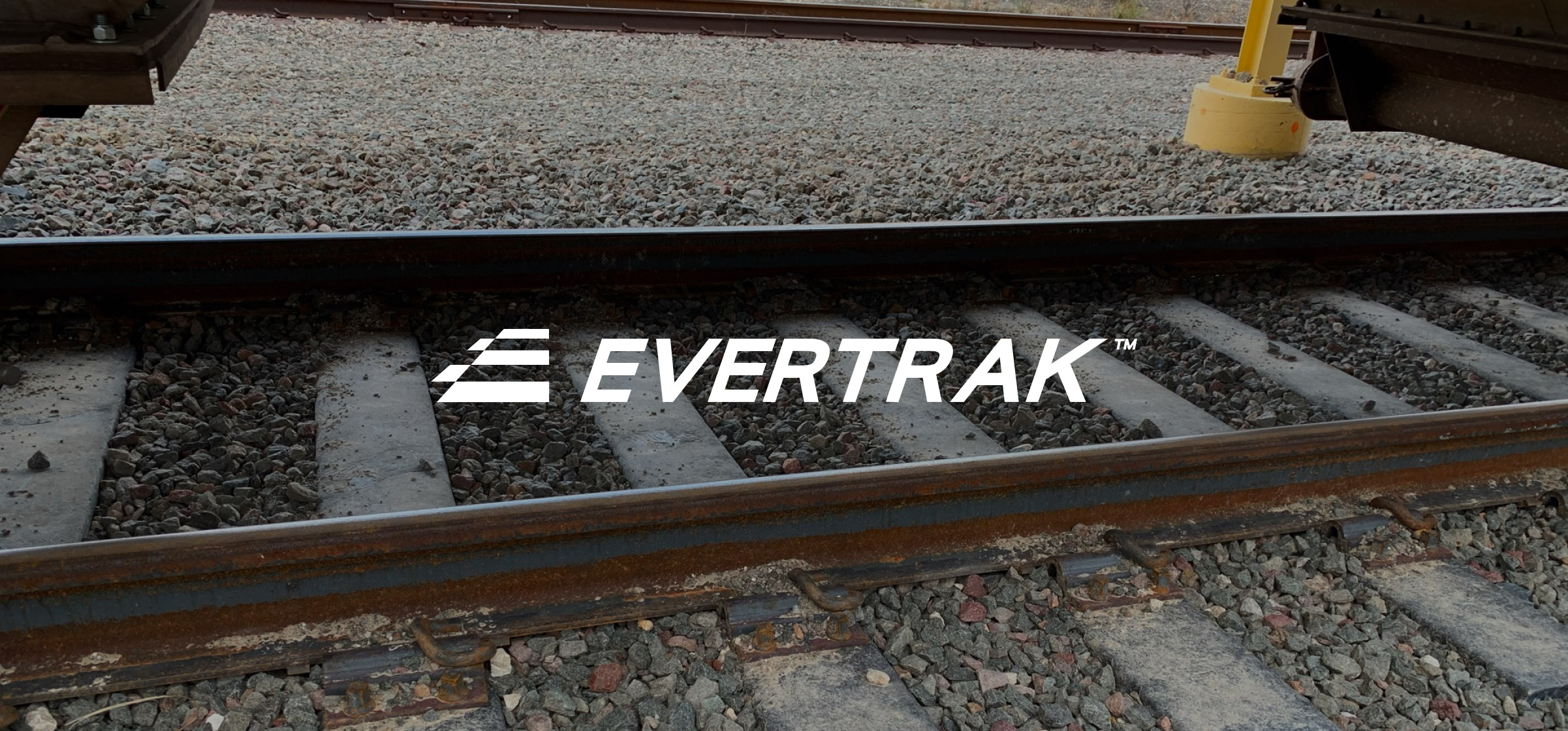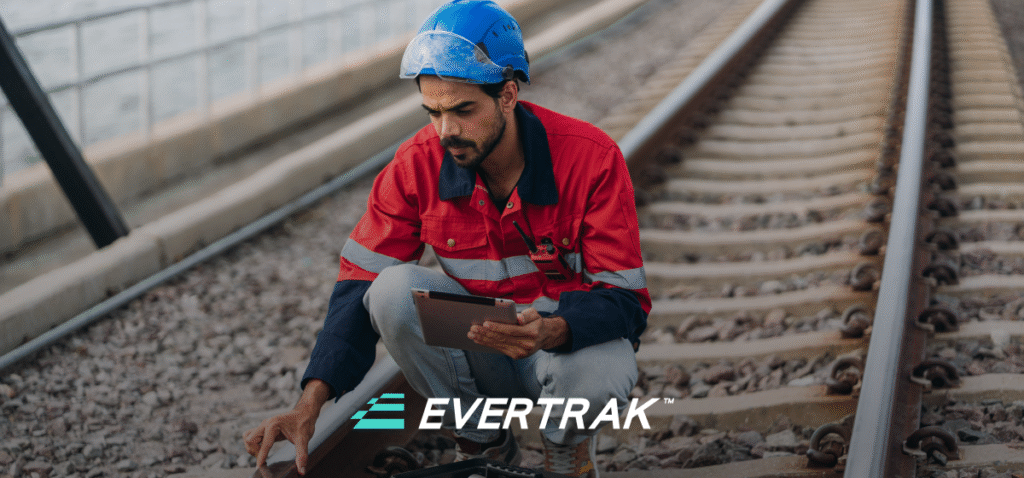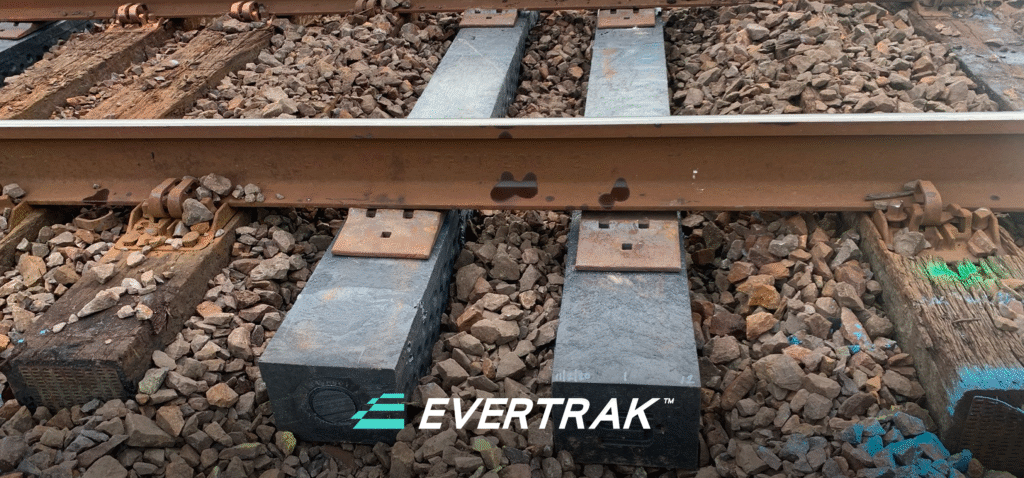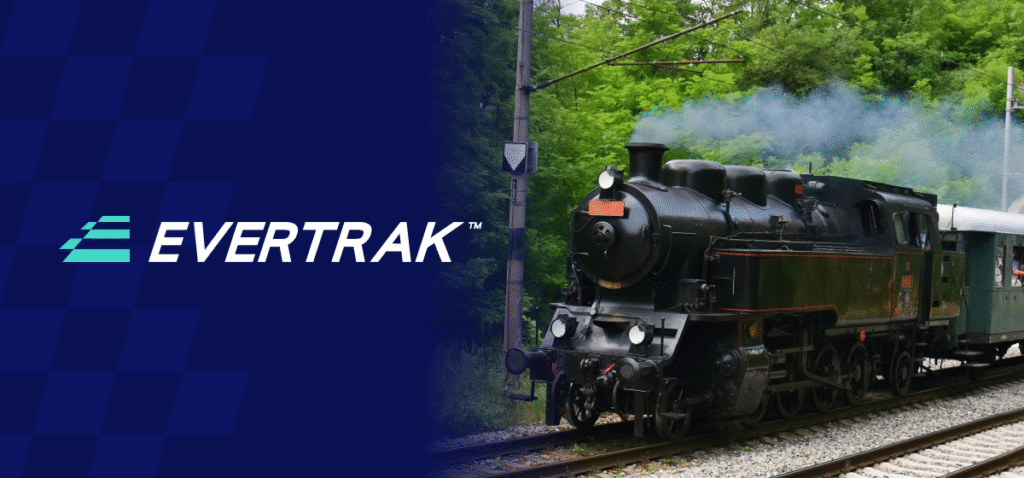Did you know approximately 20 million wood ties need to be replaced annually in North America? This represents roughly 6 million trees, and while replacing these ties is essential, the materials used are also important.
That’s why ties made from 100% recycled plastic and fiber reinforcement are becoming more prevalent. They’re completely moisture-resistant, can be interspersed with wood ties, and are suitable in areas with termite infestations, water intrusion, and soft sub-grades. Plus, they provide a host of advantages for the environment.
Beyond Wood Ties: The Sustainable Advantages of Evertrak 7000 Railroad Ties
The rail industry has long relied on traditional wood ties to support miles of track, but the drawbacks of this material have become increasingly apparent. From deforestation to decay, wood poses numerous challenges for modern railroads striving to operate efficiently and sustainably.
Evertrak 7000 composite railroad ties provide an innovative solution that outperforms wood in durability, environmental impact, and total cost of ownership.
Preserving Forests and Reducing Plastic Waste, One Tie at a Time
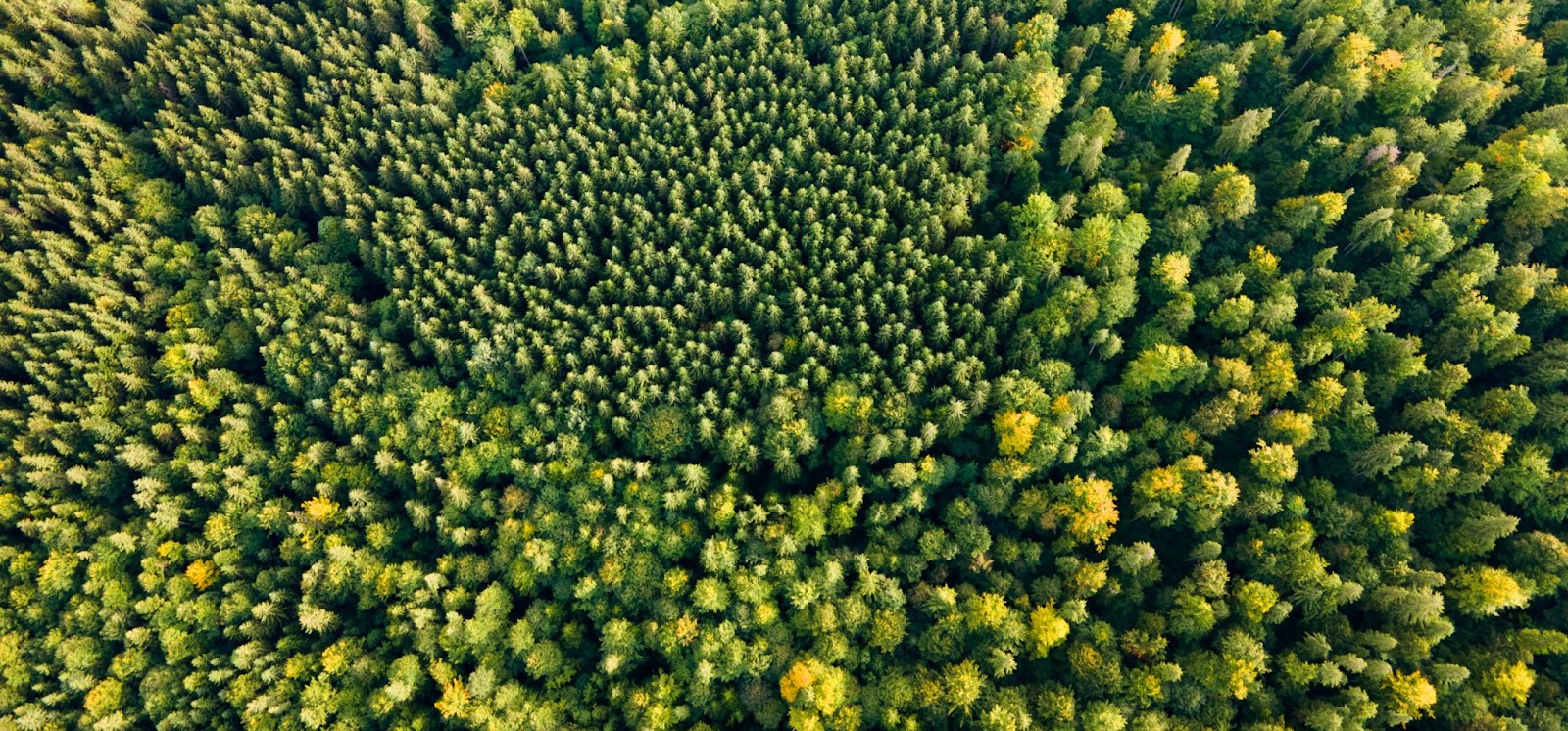
Evertrak 7000 composite ties are manufactured using recycled plastic and glass fiber reinforcement, offering a sustainable alternative to wood.
As railroads adapt to meet the modern needs of a more sustainable industry, it’s important to understand the role of wood and plastics in society. The need for environmentally-friendly materials is becoming increasingly apparent, not just for railroads but across every industry:
- At over 200 million metric tons, the U.S. is the number one producer of municipal waste.
- An estimated 21% of residential recyclables are actually recycled.
- According to the most recent numbers from the Environmental Protection Agency (EPA), the total generation of municipal solid waste (various items consumers throw away after they are used) was 292.4 million tons in 2018, and plastic products generation was 35.7 million tons (12.2%), an increase of 4.3 million tons from 2010 to 2018.
When it comes to wood, the railroad industry is contributing to deforestation. Each mile of track requires approximately 3,000 ties, and wood ties make up 90-93% of the nearly 140,000 miles of track laid across North America. Most of these wood ties have been treated with creosote, which is considered a harmful ingredient with risks that can lead to various health issues.
For the millions of wood ties no longer in service each year, many are burned to produce heat and electricity, or recycled as landscaping timbers. Some may be used as an alternative fuel in certain high-temperature combustion chambers, such as cement kilns or power plant boilers. However, the EPA notes that creosote is restricted and unavailable to treat wood for residential use. This includes landscaping and other outdoor uses.
The Rewards of Recycling
By diverting plastic from landfills and oceans, Evertrak helps railroads reduce their environmental footprint while still delivering exceptional performance.
Recycling offers multiple benefits, including:
- Reducing the amount of waste sent to landfills and incinerators
- Conserving natural resources such as timber, water, and minerals
- Increasing economic security by tapping a domestic source of materials
- Preventing pollution by reducing the need to collect new, raw materials.
- Saving energy
- Conserving valuable resources
- Helping create jobs in the recycling and manufacturing industries in the U.S.
And in a study conducted by the EPA, it was revealed that recycling and reuse activities were responsible for 681,000 jobs, $37.8 billion in wages, and $5.5 billion in tax revenues.
A Longer-lasting Product Made with Fewer Materials
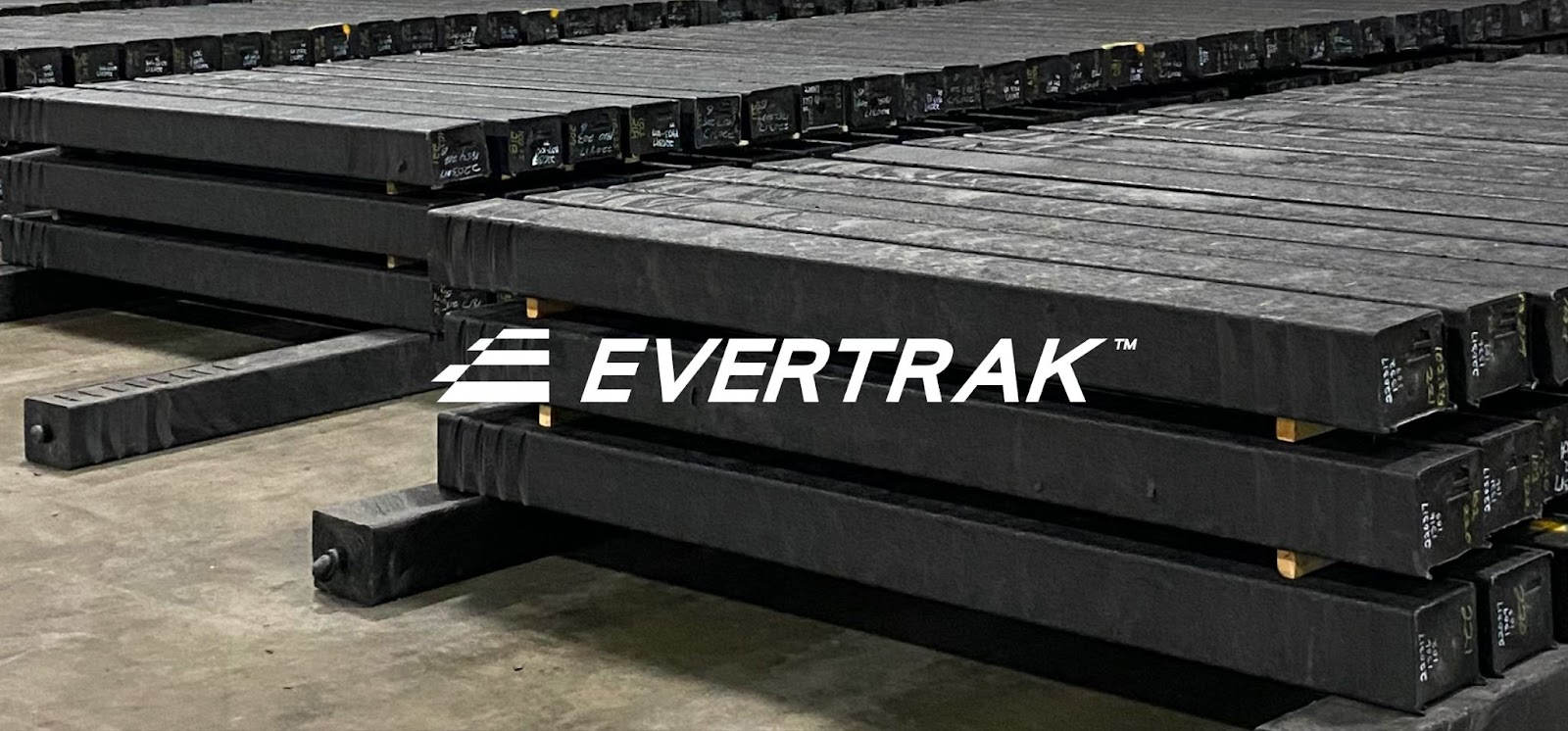
Railroad ties made of 100% reinforced recycled plastic are not only longer-lasting than their wood counterparts, but they’re also as strong as hardwood. In fact, their lifespan can be about five times longer, serving in heavy haul track for 50 years or more.
Fewer materials are utilized to manufacture reinforced recycled plastic railroad ties, meaning natural resources and energy are conserved. And at Evertrak, we prevent 250,000 mature trees from being cut down annually, meaning the environment experiences lower levels of extraction and processing.
Additionally, recycled materials have already undergone refinement and processing, so railroad ties made of recycled plastic don’t have to be thrown away and can be used to create another tie. Our manufacturing processes sequester 180 million pounds of plastic from winding up in landfill and eliminate the need for creosote.
Unmatched Durability of Composite Ties in Extreme Conditions
Composite railroad ties are engineered to withstand the toughest conditions, from moisture and insect infestation to the rigors of heavy haul track. Evertrak 7000 ties have a lifespan of up to 50 years, even in high-decay zones—a significant improvement over wood ties which typically last only 8-15 years in these challenging environments.
This longevity translates to reduced maintenance and replacement costs for railroads. Evertrak ties have been validated through extensive testing, with fatigue models showing they perform at 3x the AREMA MOR standard for composite ties.
Streamlining Operations and Maintenance
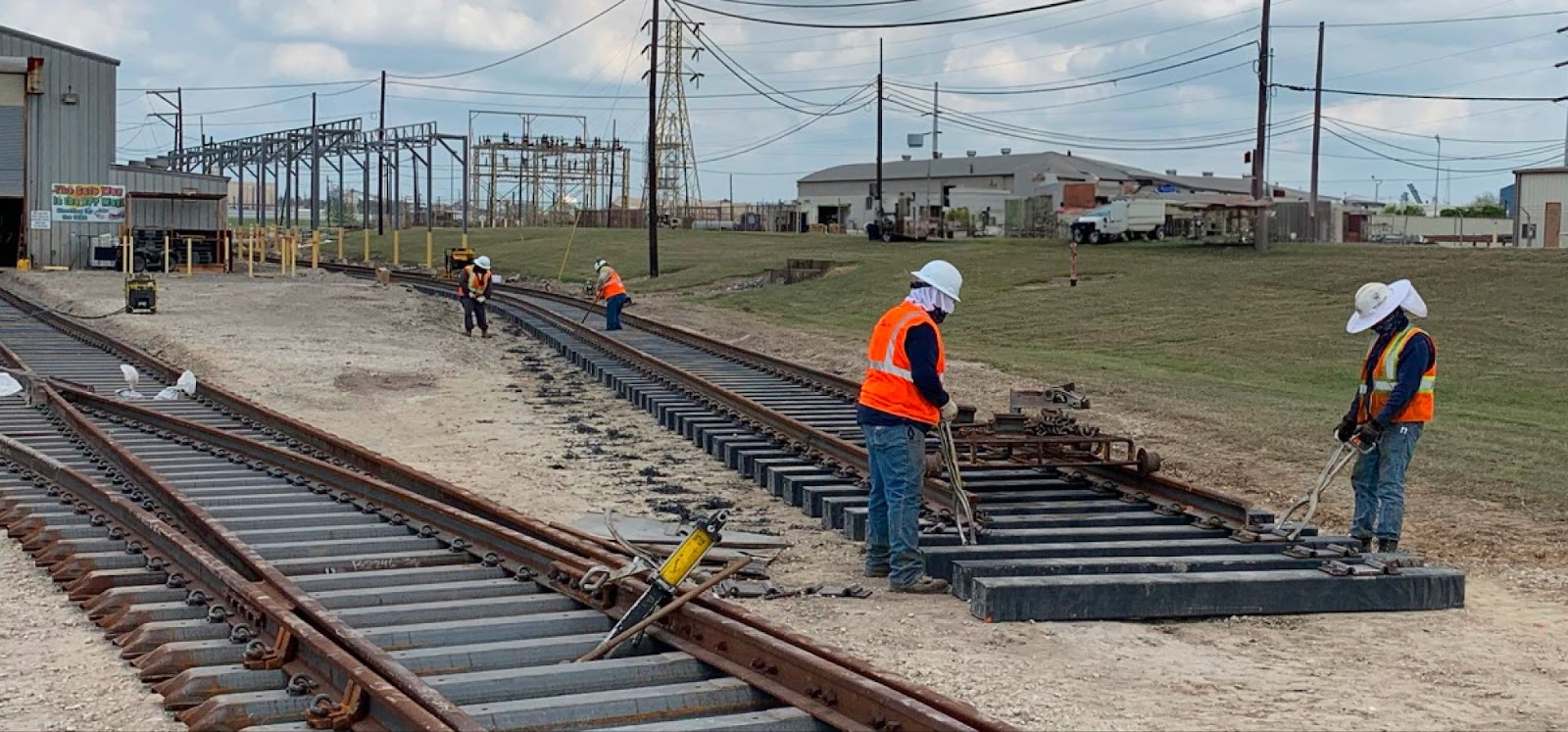
Installing Evertrak 7000 composite ties can help railroads optimize their operations. As mentioned, our composite ties are impervious to moisture and insects, eliminating the need for environmentally-hazardous preservatives like creosote commonly used on wood ties. They can be seamlessly integrated with existing wood ties and are ideal for hard-to-maintain areas like bridges and tunnels.
With over 100,000 installations, Evertrak has had zero claims, a testament to our quality and consistency.
Cost-effective Conservation
One ton of recycled plastic saves 5,774 kilowatt hours (kWh) of energy, 16.3 barrels of oil, 98 million and 30 cubic yards of landfill space. Alternatively, wood railroad ties are often disposed of in a landfill, contributing to higher greenhouse gases.
The use of reinforced recycled plastic for railroad ties and many other products assists in the goal of mitigating the harmful effects hazardous waste has on our land and in our oceans. Additionally, recycled ties adhere to newer environmental rules and regulations against the burning of chemically-treated wood materials.
Although upfront costs of composite ties may be higher than wood, Evertrak 7000 ties deliver significant savings over their extended lifespan. While some think wood ties are a cheaper option due to lower upfront costs, the amount they incur over their shorter lifespan quickly adds up, yielding a more expensive investment.
Industry estimates suggest railroads spend $95 to replace each wood tie. With 20 million ties replaced annually, railroads spend around $1.9 billion on tie replacements each year, including labor and equipment. With longer replacement cycles, composite ties lower costs over time to reduce labor and material expenses, lower operational disruption, and improve overall network reliability.
Evertrak’s composite ties are also recyclable at end of life and can be melted down into new ties without compromising performance. This cradle-to-cradle approach maximizes value and minimizes waste.
Evertrak 7000 Ties and the Environment
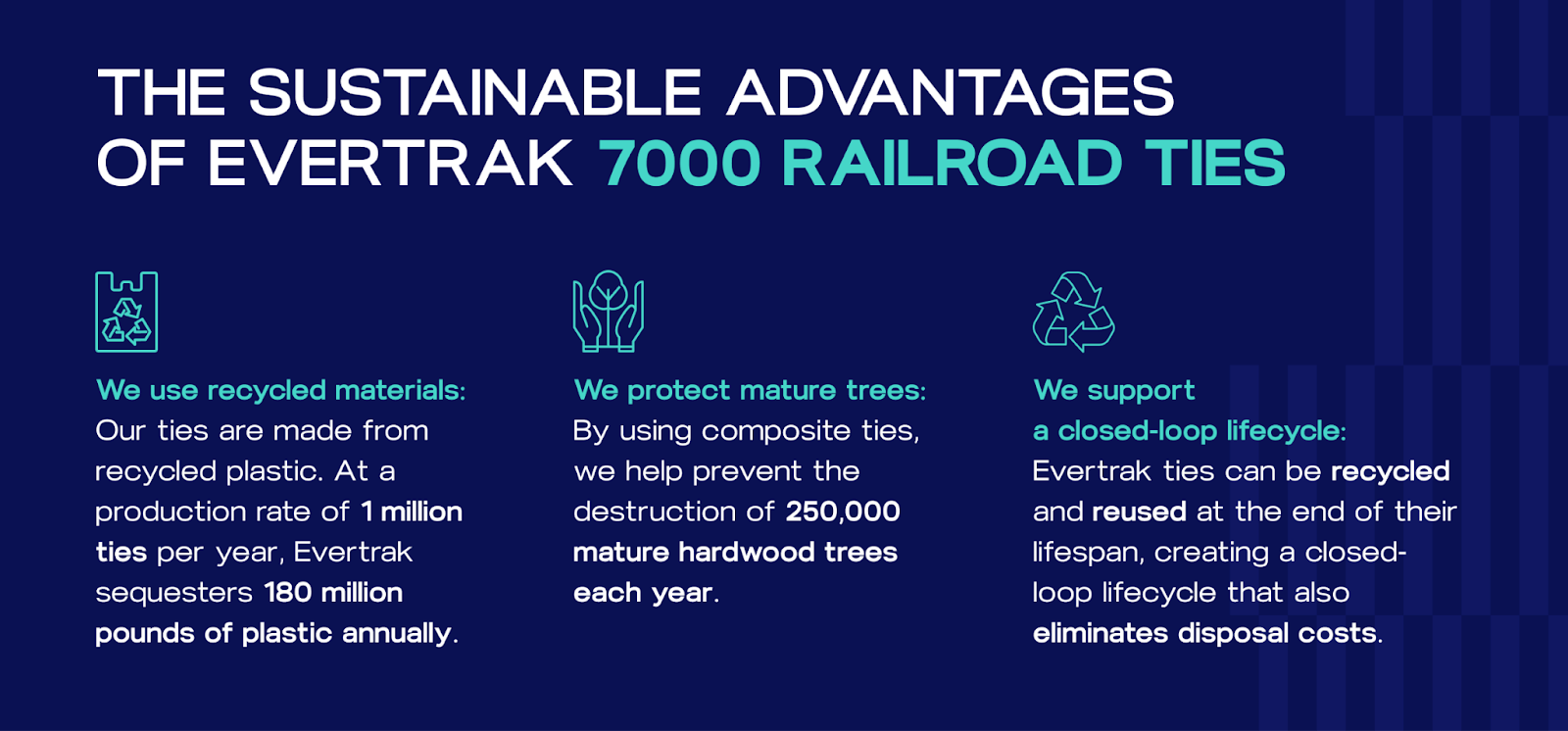
At Evertrak, we’re committed to using our technology to reclaim the plastic waste headed to oceans and landfills. That’s why we use almost 200 pounds of recycled plastic in each tie we produce.
As railroads face increasing pressure to limit their environmental impact and optimize asset management, Evertrak 7000 composite ties provide a robust, field-proven solution. By recycling plastic waste into high-performance infrastructure, Evertrak enables railroads to advance their sustainability goals while driving efficiencies that boost the bottom line. Composite ties represent the future of rail infrastructure—one that is stronger, greener, and more economical than the wood ties of the past.After decades of service, Evertrak ties will be recycled into new ties. With our technology, our true composite railroad ties save railroads money and provide a sustainable alternative to wood ties. Join the growing number of railroads transforming their infrastructure with Evertrak. Connect with our team today to learn how our composite ties can reduce your lifecycle costs.

